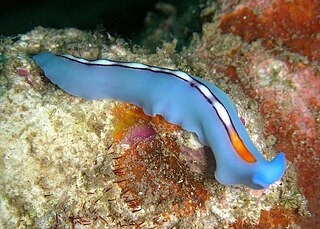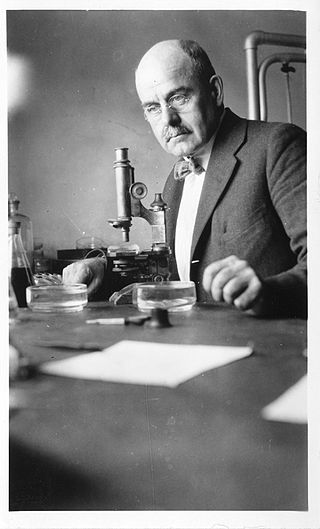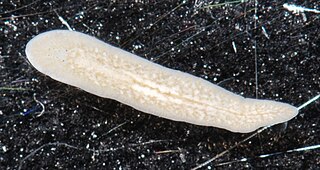
Libbie Henrietta Hyman, was an American zoologist. She wrote numerous works on invertebrate zoology and the widely used A Laboratory Manual for Comparative Vertebrate Anatomy.

Pseudocerotidae is a family of flatworms which includes the Bedford's flatworm. Pseudocerotidae are simple organisms categorized by their oval bodies and tentacles and bright colors. They use the cilia to glide along surfaces. Most commonly referred to as marine flatworms, closely related to the orders Macrostomorpha and Lecithoepitheliata. These organisms have very complex reproductive systems, no blood systems or organs for gas exchange, a simple brain and are hermaphroditic.

Pseudoceros is a genus of the flatworms Platyhelminthes.

Male accessory glands (MAG) are the seminal vesicles, prostate gland, and the bulbourethral glands. These glands are found only in mammals. In insects, male accessory glands produce products that mix with the sperm to protect and preserve them, including seminal fluid proteins. Some insecticides can induce an increase in the protein content of the male accessory glands of certain types of insects. This has the unintended effect of increasing the number of offspring they produce.

Bipalium adventitium, the wandering broadhead planarian, is a land planarian in the subfamily Bipaliinae. It has been accidentally introduced in the United States, where it is considered invasive.

Charles Manning Child was an American zoologist noted for his work on regeneration at the University of Chicago.

Pseudoceros ferrugineus, the Fuchsia flatworm, is a marine flatworm species that belongs to the Pseudocerotidae family.

Thysanozoon nigropapillosum is a species of polyclad flatworms belonging to the family Pseudocerotidae. Some common names include Gold-speckled flatworm, Marine flatworm, Yellow papillae flatworm, Yellow-spotted flatworm, and Yellow-spotted polyclad flatworm.

Pasipha is a genus of land planarians from South America.
Dendrocoelopsis americana is a species of triclad belonging to the family Dendrocoelidae. It has been found in the South Central United States.

Coeloplana astericola, the creeping comb jelly, is a species of benthic comb jelly from the tropical western Indo-Pacific region that lives as an episymbiont on starfish such as Echinaster luzonicus.
Aprostatum is a genus of flatworms belonging to the family Euplanidae.
Aprostatum clippertoni is a species of flatworm belonging to the family Euplanidae. It is found in the Northern Pacific Ocean.

Euplana is a genus of flatworm belonging to the family Euplanidae.
Euplana carolinensis is a species of flatworm belonging to the family Euplanidae. It is found within the United States in North Carolina.

Euplana gracilis is a species of marine flatworm belonging to the family Euplanidae. It is found within the United States.
Namyhplana is a genus of marine flatworm belonging to the family Euplanidae. It is monotypic, containing the sole species Namyhplana henriettae. It is found within Chile.
Anandroplana muscularis is a species of flatworm belonging to the family Ilyplanidae. It is found within Puerto Rico.
Anandroplana portoricensis is a species of flatworm belonging to the family Ilyplanidae. It is found within Puerto Rico.
Crassandros is a genus of flatworm belonging to the family Ilyplanidae. It is monotypic, containing the sole species Crassandros dominicanus. It is found on Dominica.










